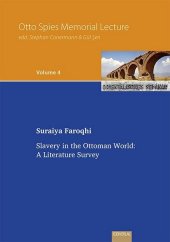 Neuerscheinungen 2017Stand: 2020-02-01 |
Schnellsuche
ISBN/Stichwort/Autor
|
Herderstraße 10
10625 Berlin
Tel.: 030 315 714 16
Fax 030 315 714 14
info@buchspektrum.de |

Suraiya Faroqhi
Slavery in the Ottoman World: A Literature Survey
2017. 60 S. 21 cm
Verlag/Jahr: EB-VERLAG (EBV) 2017
ISBN: 3-86893-250-X (386893250X)
Neue ISBN: 978-3-86893-250-8 (9783868932508)
Preis und Lieferzeit: Bitte klicken
After decades of relative neglect, Ottoman slavery in recent years has become a favoured topic among historians. New sources especially on the nineteenth and early twentieth centuries have become available, due to the progressive cataloguing of the Ottoman archives, especially the newly instituted secular Nizamiye courts providing evidence of the difficult road toward the abolition of slavery. As in the later centuries of the empire´s existence, Ottoman slaves were so often female the topic has also interested historians of Ottoman women. Given the ´literary turn´ in historiography worldwide and the critical questioning of-mostly but not exclusively-European primary sources, the reports of liberated former slaves have also attracted historians. Rather than studying slavery per se, this group of scholars investigates perceptions of ´the other´ and the ways in which ex-slaves who had managed to return to their home countries negotiated patrons and publishers in their attempts to get their stories into print.
The result is a bibliography, dating largely from recent years, with divergent directions and discourses. Perhaps the time has come to pull together the different threads and survey the results, emphasizing at every turn how provisional they really are. On this occasion, we will take the opportunity of identifying questions and sources, which, at least in the opinion of the present author, have not received the attention they deserve.
Educated at the universities of Hamburg, Istanbul and Bloomington/Indiana, Suraiya Faroqhi taught English (1971-1972) and history at Middle East Technical University, Ankara (1972-1987) and served as a professor of Ottoman Studies at the Ludwig Maximilians Universität in Munich (1988-2007). After retirement from LMU, she has worked for about ten years as a professor at the Department of History, Istanbul Bilgi University. She holds an honorary doctorate from Bogazi‡i University in Istanbul, and is an honorary member of the Middle East Studies Association, the Bilim Akademisi and the Türk Tarih Kurumu. Most recently, she has been the Shaheed Bhagat Singh Visiting Professor at Jawaharlal Nehru University/New Delhi and a fellow at JNU_s Institute of Advanced Studies. In her publications, she has focused on people who often get short shrift in Ottoman historiography, including artisans, other people making a living from their work, and women.


